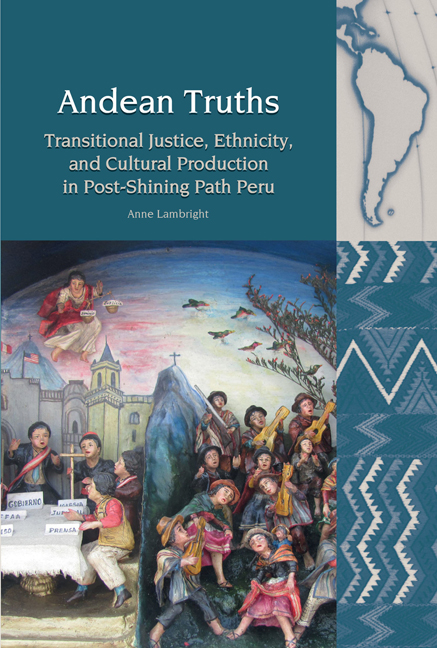Book contents
- Frontmatter
- Contents
- List of Figures
- Acknowledgements
- Introduction
- 1 Sustaining Dominant Narratives
- 2 Transitional Justice and Reconciliation through Identification
- 3 Dead Body Politics
- 4 Towards a Narrative Pachacutic
- 5 Collaborative Truth-Telling
- 6 Reconciling through other Knowledges
- 7 Conclusion
- Works Cited
- Index
4 - Towards a Narrative Pachacutic
- Frontmatter
- Contents
- List of Figures
- Acknowledgements
- Introduction
- 1 Sustaining Dominant Narratives
- 2 Transitional Justice and Reconciliation through Identification
- 3 Dead Body Politics
- 4 Towards a Narrative Pachacutic
- 5 Collaborative Truth-Telling
- 6 Reconciling through other Knowledges
- 7 Conclusion
- Works Cited
- Index
Summary
Rosa Cuchillo
Yuyachkani are not the only ones to embrace the concept of Pachacutic. Oscar Colchado Lucio's Rosa Cuchillo (1997) is a novel that aims to create a truly Andean universe, presenting a complex and thorough understanding of Andean mythology and world vision. I propose Rosa Cuchillo, one of the few texts studied here that was produced before the processes and Final Report of the CVR, as a precursor and alternative to the official transitional justice mechanisms. The novel insists on interpreting the conflict through Andean points of view, relying almost exclusively on Andean characters who in turn call upon indigenous discourse, knowledge, and spirituality to create a historical, political, and affective archive that contrasts with that created and disseminated by the state through the CVR and other processes. In recounting the past and imagining the future, Rosa Cuchillo turns to Andean subjects who speak without mediation of the state, elaborates a new geopolitical landscape based on Andean mapping and understandings of space, and promotes Andean cultural categories. Through these mechanisms, I propose the novel becomes a model of ‘intercultural communication’ and ‘epistemological decolonization’ (Quijano), and by channeling the therapeutic processing of the conflict through Andean modes of interpretation, it suggests that one possible outcome of the situation could be a cultural, if not political, Pachacutic—an Andean revolution. Furthermore, Colchado Lucio through his writing elaborates what we might call an aesthetics of reconciliation, an act of ‘literary redress’ (Irizarry) for centuries of real and symbolic violence experienced by the indigenous peoples of Peru.
A prolific poet and writer of narrative fiction, Colchado Lucio is what Marisol de la Cadena would term an ‘indigenous mestizo’ intellectual— bilingual/bicultural, he is the author of numerous novels (most written for children), collections of short stories, and poetry. While he has been awarded several literary prizes, including the Prize for the Novel from the Federico Villarreal National University (Peru) for Rosa Cuchillo in 1996 and the internationally prestigious Juan Rulfo International Short Story Award (France) for ‘La casa del cerro El Pino’ in 2002, his literary stature is shadowed by the likes of Santiago Roncaglio, Iván Thays, or Mario Vargas Llosa, though he is widely considered an intellectual and artistic successor of José María Arguedas.
- Type
- Chapter
- Information
- Andean TruthsTransitional Justice, Ethnicity, and Cultural Production in Post-Shining Path Peru, pp. 107 - 133Publisher: Liverpool University PressPrint publication year: 2015



